This tax season, Cornell and surrounding communities are invited to take advantage of two great resources: a new Volunteer Income Tax Assistance (VITA) tax clinic at Cornell and an established VITA clinic at Ithaca College (IC).
VITA clinics serve low- to moderate-income individuals, those with disabilities, seniors, and limited English speakers—including international students—to help them file their taxes each year. Each VITA site serves 200–500+ clients during tax season, significantly improving the accuracy of their returns and, in most cases, saving them hundreds or even thousands of dollars.
The IRS oversees the VITA program, which provides free tax preparation services during tax season in all 50 states. In many instances, the IRS awards matching funds to support organizations that manage these free tax clinics, including Cornell. The Cornell and IC VITA clinics are staffed by expert faculty, who recruit and train undergraduate and graduate student volunteers to work directly with clients on their returns.
Serving the greater good
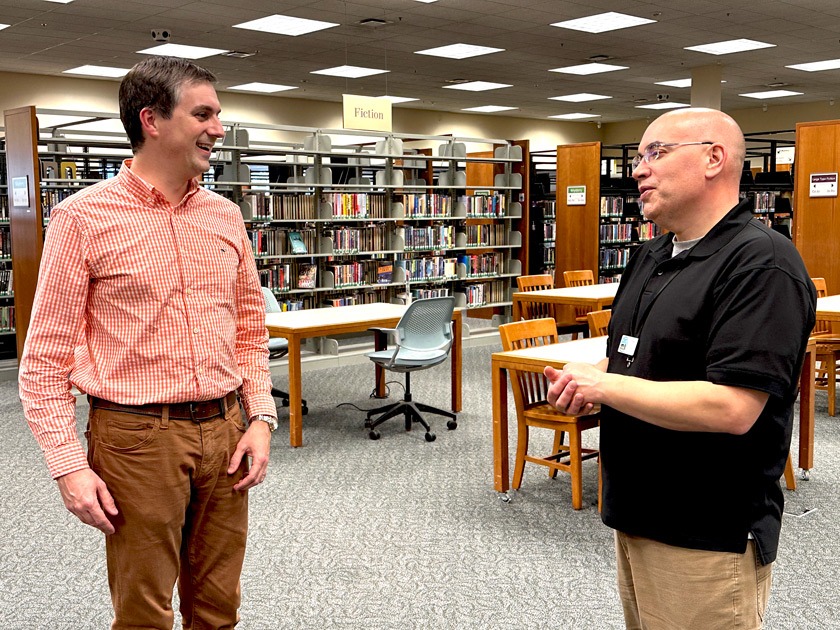
In spring 2024, Thomas Godwin, professor of practice at the Charles H. Dyson School of Applied Economics and Management, will teach a new undergraduate course focused on running a VITA site for Tompkins County, based in the public library. The course, called Tompkins Area Compliance and Consulting, will offer free tax-preparation services to the Ithaca area with Cornell as the lead agency.
Thomas, who just started teaching at Cornell this semester, ran a VITA program at Purdue University for the past seven years. The Purdue clinic was among the largest university programs in the country.
Thomas was not planning to start a VITA program at Cornell, but the 2022 closure of the VITA program based at Alternatives Federal Credit Union created a gap in local services. The new Cornell tax clinic will serve local community members impacted by the closure, along with other eligible residents.
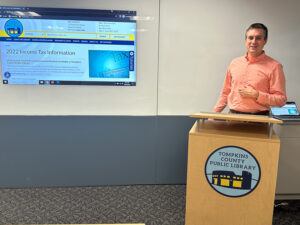
“People need to do their taxes. Getting everything done for free is really significant,” he says.
Thomas explains that local partners—including the Human Services Coalition, Tompkins County Public Library, and former volunteers from the Alternatives site—came together to support the creation of the new Cornell-led clinic.
“There was a consortium of people trying to keep everybody connected. I came along and asked, ‘Hey, who does this?’ And they said, ‘Actually, no one.’”
Thomas, whose doctoral research focused on corporate accounting, says that his initial experience working in a VITA clinic was life-changing. He recalls one family whom he worked with at the Purdue VITA site in Indiana:
“We had a family that came in every single year. They were a family of six, making $22,000 a year working basically minimum-wage, fast-food jobs. With the tax credits that they would get, they would typically walk out with a refund in excess of $10,000,” Thomas says. “To see the amount of good that you can do in the community through something like that—it kind of reoriented my focus.”
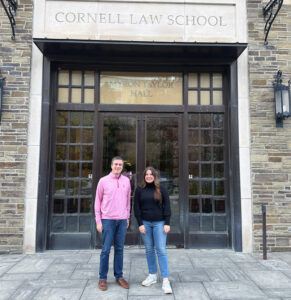
By the end of Thomas’s tenure, the Purdue VITA clinic was processing more than 3,000 tax returns per year and producing about three million dollars of impact for its clients—through a combination of tax refunds and savings on tax preparation fees.
The new course will also involve Cornell undergraduate students in the VITA tax work, firsthand.
“It’ll be a student-run type clinic, so the students are empowered to take charge. Cornell students are outstanding, and they’ll pick up how to help their clients very, very quickly,” Thomas says.
The Cornell clinic aims to help local residents file about 500 returns in 2024, utilizing a combination of community-based volunteers, undergrad students, and two third-year Cornell Law School students—Claire Dobbs and James Herrmann.
James said he volunteered to assist with the clinic because “it looked like a great opportunity to put some of what I had learned in school towards a good cause.”

He’s been helping local clients since spring 2023. James notes that most clients are mystified by the tax system, and so he helps them apply for and receive all the various credits and deductions for which they’re eligible. He’s especially proud of the work he’s done for exonerated persons who have recently been released from prison.
“They often have wrongful conviction compensation money that they aren’t sure how to report, and they’re often unaware of certain new kinds of credits which may substantially increase their refund. We make sure that they get the best possible outcome, minimizing how much they owe and hopefully getting them a decent refund,” James says.
Thomas notes that programs like the VITA clinic can help to bring the community together for the common good.
“Sometimes there’s a pretty deep divide between being on top of the hill and coming down the hill and trying to start breaking that down,” he observes.
Translating U.S. tax requirements for international students
Tax question from an international graduate student at Cornell:
“I’ve been studying at Cornell on a student visa and in the U.S. for more than five years. Am I considered a U.S. resident for tax purposes? How do I file? My family is also in the U.S. Can I file with my spouse and claim our children?”
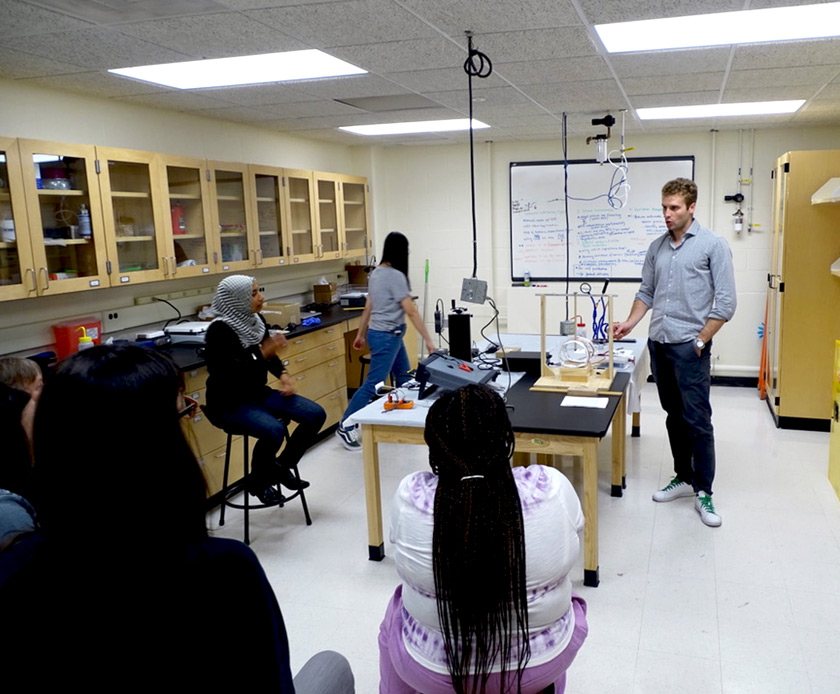
Ludovico Cestarollo PhD ’24, an Italian native, began his doctoral program in materials science and engineering in fall 2019. That spring, the COVID-19 pandemic shuttered campus and Ludovico struggled to find help to file his taxes. Some of documents he had received were incorrect, and he needed to correct them in order to avoid overpaying thousands of dollars.
After calling around, he was directed to Kari Smoker, director of the VITA program at IC. At the start of the pandemic, Kari petitioned the IRS to transition the IC clinic online. The IC VITA clinic was one of just two sites in New York State which were sanctioned to operate virtually during the height of the pandemic.
“I had to file an amended return for 2019, and my tax documents for 2020 had some mistakes that were complicating my return,” Ludovico says. “I had no idea where to start from, and the thought of making mistakes while filing taxes was very worrying for me. This is when I met Kari. My experience has been incredible, and she has helped me so much since then.”
Kari, an attorney and associate professor of accounting and business law at the Ithaca College School of Business, works with a team of undergraduate and graduate accounting students to assist clients like Ludovico with complex tax situations. The IC clinic has been serving international students and community members for more than three decades—including several Cornell students from Afghanistan, as well as asylum seekers who sought refuge in Ithaca from places across the globe.
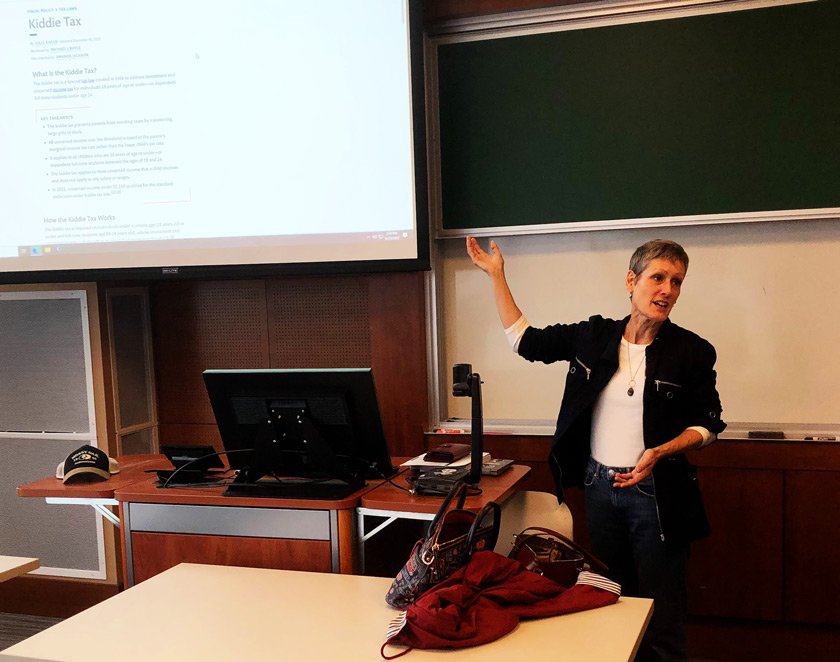
Many of these people do not understand their tax liability, Kari explains. For example, some international students receive generous aid packages from Cornell, including support to assist with food, housing, healthcare, and personal needs. These students do not realize that they have a tax liability on their income, which includes the stipends they received.
“Because they received money that covered their health insurance, housing, and meal plan—they’re being taxed on that income,” Kari observes. “Their tax obligation might be $3,000, or maybe $5,000 if they also worked a job. But they’re not saving money in anticipation of this tax.”
Kari and her graduate students at IC work with these international students to help them understand their tax liability, and to make a plan to set aside funds to meet their obligation moving forward.
“The international students are so grateful to know this is what they owe,” Kari says. “It’s very frightening when they don’t understand, and a U.S. government agency is sending them letters or expecting them to file something.”
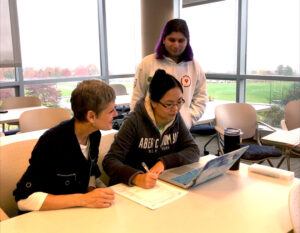
Kari says that the IRS has been quite willing to work with her clients to set up payment plans, when necessary. The IC VITA clinic now serves about 200 clients, including many international students at Cornell. Some of these clients come back year after year, like Ludovico does, because they deeply appreciate the help they receive.
When asked how she survives the crunch during tax season, Kari says the ongoing relationships she builds with her clients are energizing. She also reflects on the growth she sees in her student volunteers.
“They go from being terribly afraid of the software and working with clients to being extremely confident. Wow!” she says.
Learn more about Cornell’s Low-Income Taxpayer Law and Accounting Practicum (LITLAP), which works alongside the VITA clinics. About 75% of LITLAP clients are farmworkers, and most are undocumented. The practicum also collaborates with After Innocence to serve U.S. clients who have recently been exonerated from the criminal justice system or released from wrongful convictions.


